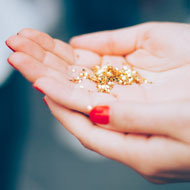RSPB warns against glittery ‘reindeer food’

‘Reindeer food’ containing substances such as oats and glitter are available to buy at this time of year.
The RSPB is warning families not to scatter glitter or sequins outdoors for ‘Santa’s reindeers’ this Christmas, as they are harmful to wildlife and the environment.
‘Reindeer food’ containing substances such as oats and glitter are available to buy at this time of year, so that children can scatter it on the lawn on Christmas Eve.
However, the RSPB is urging the public not to use mixes containing glitter or sequins, as anything made from plastic causes stomach problems for most animals if eaten, as well as being harmful to the environment.
Cake sprinkles or edible glitter should also be avoided as they often contain e-numbers.
Instead, the charity is recommending a nature-friendly recipe that can be safely eaten by birds. RSPB recommends mixing up raw porridge oats, sunflower seeds and nyjer seeds. For colour, blueberries or apple can be added.
Sprinkle into a tray or bowl on Christmas Eve for a festive treat for reindeer (and birds).



 The Veterinary Medicines Directorate (VMD) is inviting applications from veterinary students to attend a one-week extramural studies (EMS) placement in July 2026.
The Veterinary Medicines Directorate (VMD) is inviting applications from veterinary students to attend a one-week extramural studies (EMS) placement in July 2026.